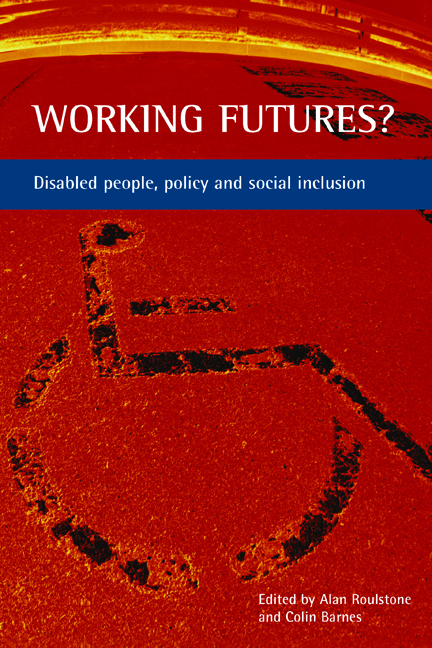Book contents
- Frontmatter
- Contents
- List of figures, tables and boxes
- Preface
- Acknowledgements
- List of abbreviations
- Notes on contributors
- Introduction Working futures: disabled people, employment policy and social inclusion
- Part One Work, welfare and social inclusion: challenges, concepts and questions
- Part Two The current policy environment
- Part Three Towards inclusive policy futures
- Index
- Also available from The Policy Press
twenty three - Conclusions
Published online by Cambridge University Press: 18 January 2022
- Frontmatter
- Contents
- List of figures, tables and boxes
- Preface
- Acknowledgements
- List of abbreviations
- Notes on contributors
- Introduction Working futures: disabled people, employment policy and social inclusion
- Part One Work, welfare and social inclusion: challenges, concepts and questions
- Part Two The current policy environment
- Part Three Towards inclusive policy futures
- Index
- Also available from The Policy Press
Summary
In this brief postscript, we reflect on some of the key policy insights to flow from this book's chapters. These empirical and theoretical insights have provided a detailed appraisal of a range of key disability and employment policies and have established the benefits and limitations of current policies. Given the broader objectives of translating new ideas into changing policy and practice the key policy points are laid out later in this chapter.
Working futures? makes clear both the continuities and changes that marked the shift from neo-Conservative to New Labour governments. A continued commitment to making welfare conditional upon certain types of active labour market behaviour characterises the links between these approaches. There is once again continuity between these political and policy responses to the challenge of employing more disabled people. However, the old distinctions between deserving and undeserving have been shifted to reflect the alterations to the ‘disability category’, which are at the heart of New Labour's dichotomous treatment of work for those who can and support for those who cannot. In practice, while this commits far more than governments of the 1980s and early 1990s, it does oversimplify the relationships between paid work, disability, impairment and perceptions of the value of paid work for disabled people.
While the Conservative governments of 1979-97 made efforts to distinguish between levels of support in terms of daily disability support (Disability Living Allowance mobility and care components), it has been New Labour that has looked more fully at the range of disability employment programmes with the aim of more targeted support.
There is evidence in this book's chapters that some policy and programme improvements have taken place, and these are clearly to be welcomed. Specifically, more flexible benefit linking rules, a less fragmented employment and benefits service and the mainstreaming of disability tax credits. The emphasis in WORKSTEP, the new supported employment programme is philosophically and practically on open as opposed to segregated or subsidised employment, this too has to be welcomed for many disabled people for whom this represents a further step towards social integration.
There are many continued limitations and concerns, however, about current disability and employment policy and programmes.
- Type
- Chapter
- Information
- Working Futures?Disabled People, Policy and Social Inclusion, pp. 329 - 334Publisher: Bristol University PressPrint publication year: 2005



